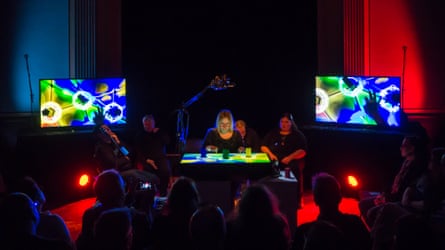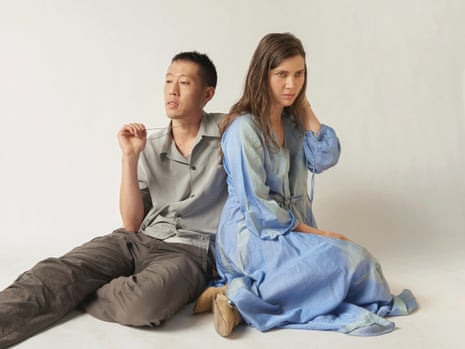Releasing an album can take years, but, by December, the City of Melbourne-run Heavy Machinery Records imprint will have commissioned and released dozens of them in little more than a year as part of Flash Forward – a vast series of commissions linking 40 music acts with 40 contemporary visual artists, who will bring their work to 40 Melbourne laneways. Melbourne’s current Covid-19 lockdown has put a pause on the live performance and public art elements for now, but its music has begun to trickle out.
Jointly funded by the City of Melbourne and the Victorian government, through the $500m Working for Victoria fund, each project received up to $20,000 to create new work. Some artists were invited, while others were chosen via a submissions process advertised on Sidekicker. Each release will be pressed to vinyl.
“The amazing thing about the project is how different [it is] to the grant process… there’s a really amazing lack of paperwork and red tape, a real trust,” says Nigel Yang, one half of rock band HTRK, whose fifth studio album, Rhinestones, is released through the program on 17 September. “Just not having to overthink your concept or approach, or how your album’s gonna be ‘opening up new markets’ – the jargon that you have to get used to when receiving any money from the government.”
With their funding, Yang and Jonnine Standish, HTRK’s other half, were able to work fulltime on the album for more than three months, rather than having to navigate the disruptions caused to the creative process by the necessities of supplemental work – a perpetual challenge in the past.
“You might have an idea on Monday, and then on Tuesday you can bring that idea to fruition, rather than two weeks later, when you get to meet again,” Standish says. “We’ve been able to make an album that we really love.”
Rhinestones has been in the works since early 2020, when HTRK began broadcasting a radio show on London’s NTS Radio. While programming the show, Standish and Yang found themselves frequently turning to gothic folk and sparse country music to fill out their tracklist – sounds that form the sonic backbone of Rhinestones. Pre-release, the album is being fed to radio stations in one hit, allowing them to cherrypick songs for broadcast. For many, especially in Melbourne, radio has been a tangible connection to the world beyond lockdown. Rhinestones is a mournful dedication to the medium.
Flash Forward’s curators included in their line-up established Melbourne bands such as HTRK, Emma Donovan & the Putbacks and My Disco, but the bulk of releases as part of the project are by emerging artists from diverse backgrounds and underrepresented musical subcultures.
There’s experimental club music on Female Wizard’s debut album, TIE-EE-YIE-EE-YIE-EE-YIME, whose creator Alexander Powers is a much-loved fixture on the city’s DJ circuit, and a member of its trans community. At the far end of the experimental spectrum is Deep Creatures by the Amplified Elephants – a long-running ensemble of sound artists, who identify as neuro-diverse or live with intellectual disabilities including autism, Down’s syndrome and acquired brain injuries.

“It’s a real mixture of people in the group,” says the group’s mentor James Hullick, director and CEO of JOLT Arts, the sound art organisation that facilitates the Elephants’ work. “And that’s one of the best and most exciting things about it. We get this sort of diversity of experience, informing what gets made, what sounds get made.”
The record’s a virtually beatless, fantastical underwater tale of a young woman drawn to the sea, who finds a sunken ship, a giant clay urn and godlike sea creatures. A live performance will eventually be presented alongside works by digital artist and architectural designer Ruofan Lei in Smythe Lane.
Reaching huge commercial audiences isn’t a reality for artists making music at the outer edges of the avant-garde, like the Elephants. But Hullick believes that’s beside the point, seeing experimental music’s value in its ability to open new frontiers of creativity.
“You might say to them ‘why did they bother putting this work out if not many people want to listen to it?’,” says Hullick. “Nothing happens if you have that mindset … it’s really trying to benefit humanity at its core, by expanding our understanding of our sensory perception.”

Other albums bridge cultures and contexts – such as Mindy Meng Wang’s Phoenix Rising. Wang, who was born in China and now calls Melbourne home, is an expert player of the guzheng – a harp-like instrument with an over 2,000-year-old tradition in Chinese classical music. Usually rigidly deployed, Wang pushes the ancient instrument in bold directions: improvising, playing western chords, bowing its strings, or using percussive and sliding notes inspired by the slide guitar.
Six of Phoenix Rising’s seven tracks build on collaborations Wang had previously been unable to record, including with Paul Grabowsky and Violent Femmes’ Brian Ritchie. Its first side uses acoustic instruments, while its second incorporates electronic textures in a haunting, at times jagged, meeting of old and new. Its release has been paired with an installation of brightly coloured abstract paintings in Whitehart Lane, by multidisciplinary graffiti artist Shay Bakar.
“It’s definitely a much deeper level of conversation between me and my audience [than my previous albums],” Wang says. The album’s title references both her boundary-pushing technique, and to disembarking the emotional roller coaster of the past 18 months.
“We’ve struggled with a lot of complex emotions in the last year, compared with normal times some are definitely more intense and darker,” Wang says. “I wanted people to be able to find a light, to understand themselves and find a freedom in the music; where they can release those emotions and feel positive, hopeful.”

Comments (…)
Sign in or create your Guardian account to join the discussion